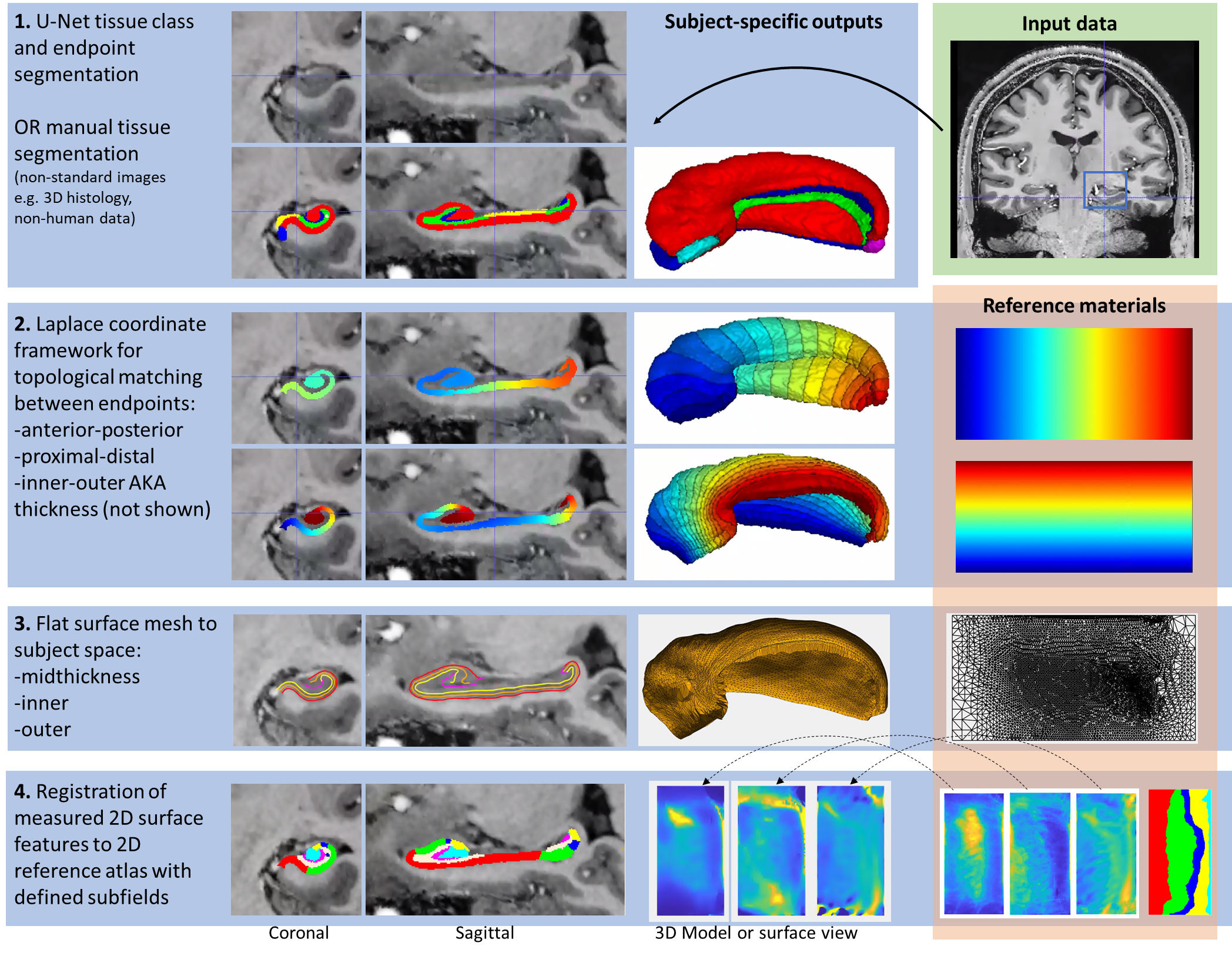Full Documentation: here
This tool aims to automatically model the topological folding structure
of the human hippocampus, and computationally unfold it.

This is especially useful for:
- Visualization
- Topologically-constrained intersubject registration
- Parcellation (ie. registration to an unfolded atlas)
- Morphometry (eg. thickness, surface area, curvature, and gyrification measures)
- Quantitative mapping (eg. map your qT1 MRI data to a midthickness surface; extract laminar profiles perpendicular to this surface)
Major changes include the addition of unfolded space registration to a reference atlas harmonized across seven ground-truth histology samples. This method allows shifting in unfolded space, providing even better intersubject alignment.
Note: this replaces the default workflow, however you can revert to the legacy workflow, disabling unfolded space registration, by setting --atlas bigbrain or --no-unfolded-reg
Read more in our manuscript
Also the ability to specify a new experimental UNet model that is contrast-agnostic using synthseg and trained using more detailed segmentations. This generally produces more detailed results but has not been extensively tested yet.
Note: Docker containers for version 1.3.x and above do not come pre-shipped with nnU-net models (and are accordingly more lightweight!) - models are downloaded automatically when running, but please see the FAQ for more information!
The overall workflow can be summarized in the following steps:
For more information, see Full Documentation: here
For plotting, mapping fMRI, DWI or other data, and manipulating surfaces, see here
For statistical testing (spin tests) in unfolded space, see here
- DeKraker, J., Haast, R. A., Yousif, M. D., Karat, B., Lau, J. C., Köhler, S., & Khan, A. R. (2022). Automated hippocampal unfolding for morphometry and subfield segmentation with HippUnfold. Elife, 11, e77945. link
- Please cite this if you use any version of HippUnfold)
- DeKraker Jordan, Palomero-Gallagher Nicola, Kedo Olga, Ladbon-Bernasconi Neda, Muenzing Sascha E.A., Axer Markus, Amunts Katrin, Khan Ali R., Bernhardt Boris, Evans Alan C. (2023) Evaluation of surface-based hippocampal registration using ground-truth subfield definitions eLife 12:RP88404 link
- Please cite this if you use HippUnfold version >= 1.3.0)
- DeKraker J, Köhler S, Khan AR. Surface-based hippocampal subfield segmentation. Trends Neurosci. 2021 Nov;44(11):856-863. doi: 10.1016/j.tins.2021.06.005. Epub 2021 Jul 22. PMID: 34304910. link
- DeKraker J, Ferko KM, Lau JC, Köhler S, Khan AR. Unfolding the hippocampus: An intrinsic coordinate system for subfield segmentations and quantitative mapping. Neuroimage. 2018 Feb 15;167:408-418. doi: 10.1016/j.neuroimage.2017.11.054. Epub 2017 Nov 23. PMID: 29175494. link
- DeKraker J, Lau JC, Ferko KM, Khan AR, Köhler S. Hippocampal subfields revealed through unfolding and unsupervised clustering of laminar and morphological features in 3D BigBrain. Neuroimage. 2020 Feb 1;206:116328. doi: 10.1016/j.neuroimage.2019.116328. Epub 2019 Nov 1. PMID: 31682982. link
- Karat BG, DeKraker J, Hussain U, Köhler S, Khan AR. Mapping the macrostructure and microstructure of the in vivo human hippocampus using diffusion MRI. Hum Brain Mapp. 2023 Nov;44(16):5485-5503. Epub 2023 Aug 24. PMID: 37615057; PMCID: PMC10543110.link



